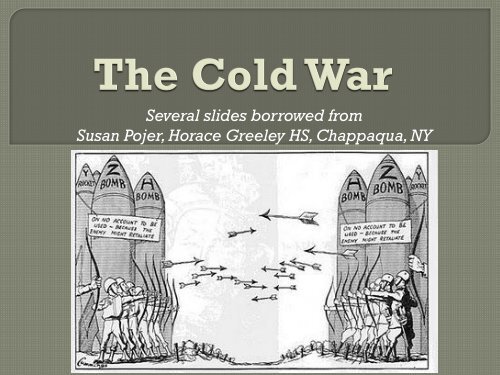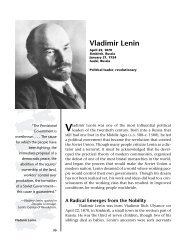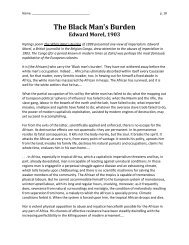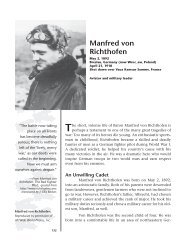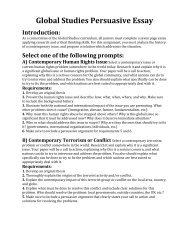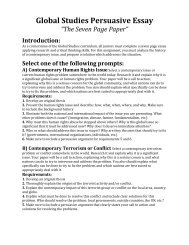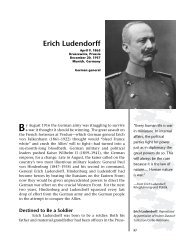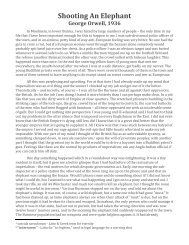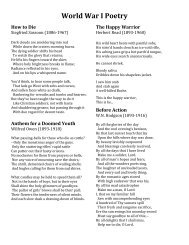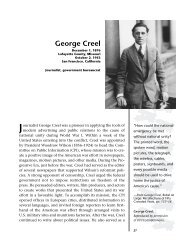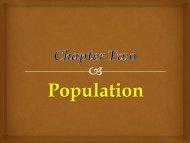Cold War PowerPoint
Cold War PowerPoint
Cold War PowerPoint
Create successful ePaper yourself
Turn your PDF publications into a flip-book with our unique Google optimized e-Paper software.
Several slides borrowed from<br />
Susan Pojer, Horace Greeley HS, Chappaqua, NY
“Under Lenin the Soviet Union was like a<br />
religious revival, under Stalin like a prison,<br />
under Khrushchev like a circus, and under<br />
Brezhnev like the U.S. Post Office.”<br />
Jimmy Carter, November 7, 1977
The Ideological Struggle<br />
Soviet & Eastern<br />
Bloc Nations<br />
[“Iron Curtain”]<br />
US & the<br />
Western<br />
Democracies<br />
GOAL spread worldwide<br />
Communism<br />
METHODOLOGIES:<br />
Espionage [KGB vs. CIA]<br />
Arms Race [nuclear escalation]<br />
GOAL “Containment”<br />
of Communism & the<br />
eventual collapse of the<br />
Communist world.<br />
[George Kennan]<br />
Ideological Competition for the minds and hearts of Third<br />
World peoples [Communist govt. & command economy vs.<br />
democratic govt. & capitalist economy] “proxy wars”<br />
Bi-Polarization of Europe [NATO vs. <strong>War</strong>saw Pact]
“From Stettin in the<br />
Balkans, to Trieste in<br />
the Adriatic, an iron<br />
curtain has descended<br />
across the Continent.<br />
Behind that line lies the<br />
ancient capitals of<br />
Central and Eastern<br />
Europe.”<br />
Winston Churchill, 1946<br />
Independence, Missouri
1. “European Recovery Program”<br />
2. Secretary of State, George Marshall<br />
3. The U. S. should provide aid to all European nations<br />
that need it. This move is not against any country or<br />
doctrine, but against hunger, poverty, desperation,<br />
and chaos.<br />
4. $12.5 billion of US aid to Western Europe extended<br />
to Eastern Europe & USSR, [but this was rejected].
United States<br />
France<br />
<br />
Norway<br />
<br />
Belgium<br />
Iceland<br />
<br />
Portugal<br />
<br />
Britain<br />
Italy<br />
<br />
1952: Greece & Turkey<br />
<br />
Canada<br />
Luxemburg<br />
<br />
1955: West Germany<br />
<br />
Denmark<br />
Netherlands<br />
<br />
1983: Spain
• U. S. S. R.<br />
• Albania<br />
• Bulgaria<br />
• Czechoslovakia<br />
• East Germany<br />
• Hungary<br />
• Poland<br />
• Rumania
Is he as crazy<br />
as he comes<br />
off in public
Imre Nagy, Hungarian<br />
Prime Minister<br />
• Promised free elections.<br />
• This could lead to the end of<br />
communist rule in Hungary.
<strong>Cold</strong> <strong>War</strong> ---><br />
Tensions<br />
Col. Francis Gary Powers’<br />
plane was shot down over<br />
Soviet airspace.
Khrushchev & JFK meet to discuss Berlin and<br />
nuclear proliferation. Khrushchev thinks that<br />
JFK is young, inexperienced, and can be rolled.
Checkpoint<br />
Charlie
CIA trained Cuban exiles<br />
attempted to Invade Cuba<br />
in April 1961<br />
Early efforts failed to deceive<br />
the Cubans before the invasion.<br />
Castro claimed victory for defending against these<br />
mercenaries, and emboldened Cuban communists.
The United States paid<br />
$53 million for the<br />
release of the rebels.<br />
Kennedy gave them a<br />
hero’s welcome at the<br />
Miami Orange Bowl,<br />
but tensions remain<br />
between the two<br />
countries.
Khrushchev removed for<br />
economic struggles and<br />
foreign policy blunders<br />
Second longest serving<br />
Soviet Premier<br />
Major investments in the<br />
military during his regime.
Former Czech President,<br />
Alexander Dubček<br />
Communism with a human face!
Dissidents/playwrights arrested [like Vaclav Havel -<br />
future president of a free Czech Republic].
"When forces that are hostile to socialism try to turn<br />
the development of some socialist country towards<br />
capitalism, it becomes not only a problem of the<br />
country concerned, but a common problem and<br />
concern of all socialist countries.”<br />
Retroactively justifies actions in Hungary and<br />
Czechoslovakia<br />
Limits independence of states in <strong>War</strong>saw Pact, and<br />
prohibits withdrawal from the Eastern Bloc
Marxists overthrow Pres.<br />
Mohammad Khan<br />
Struggle to gain popular<br />
support and seek Soviet help.<br />
Mujahedeen (“those engaged<br />
in jihad”) resist the new<br />
government<br />
Brezhnev sends Red Army to<br />
overthrow existing leadership and<br />
restructure the government<br />
Soviets struggle for 10 years, leave in<br />
1989.
After taking office,<br />
Gorbachev promises<br />
Perestroika (restructuring)<br />
Allow for multi-candidate<br />
(not multi-party) elections<br />
Reduce congress seats from<br />
2,250 to 542 to improve<br />
functionality<br />
Beginning of the end for the<br />
Soviet Union
Nuclear reactor<br />
malfunctions in Ukraine on<br />
April 26, 1986<br />
Soviets don’t release any<br />
information about<br />
explosion until Swedish<br />
scientists detect radiation<br />
38 perish in accident, up to<br />
100,000 die from radiation<br />
Reveals distrust of Soviet<br />
government within USSR
Gorbachev realizes skepticism<br />
will prevent Perestroika<br />
Glasnost (openness) provides<br />
more access to Soviet records<br />
and reduced censorship<br />
Journalists can speak to doctors<br />
and recovery workers at<br />
Chernobyl<br />
True scale of Stalin’s crimes<br />
released to public
Music was heavily censored in<br />
the USSR, but Leningrad had a<br />
strong underground rock<br />
scene<br />
Many take low status jobs to<br />
focus on music<br />
Under glasnost, major bands,<br />
such as Aquarium and KINO,<br />
can begin playing in public<br />
Some artists feel like these<br />
public performances break the<br />
nature of protest in past music
In June 1987, Ronald Reagan<br />
makes a passionate plea to<br />
allow for East Germans to<br />
travel freely<br />
As Hungary removes travel<br />
restrictions to Austria, many<br />
E. Germans flee this way<br />
November 9, 1989 the East<br />
German government lifts<br />
travel restrictions
In February 1991, national<br />
leaders agree to dissolve<br />
the defensive alliance as it<br />
lacked popular support<br />
The coalition only launched<br />
two attacks through their<br />
existence, and both involved<br />
suppressing rebellion within<br />
their government.
Glasnost allows<br />
demonstrators in the<br />
Baltic States to<br />
organize protests.<br />
Estonia, Latvia, and<br />
Lithuania demand<br />
sovereignty<br />
USSR imposes<br />
economic sanctions,<br />
but budget struggles<br />
prevents Gobechev<br />
from fighting for<br />
them.
Boris Yeltsin was a prominent<br />
member of the Communist<br />
party from the Ural Mountains<br />
Yeltsin resigns from the<br />
Politburo in 1987 in protest<br />
He is elected president of<br />
Russia in 1991<br />
He begins pressuring USSR for<br />
more autonomy<br />
Becomes a central reform<br />
figure during . . .
Hardline members of the Communist Party see the<br />
Soviet system crumbling<br />
The “Gang of Eight” (or the “State Committee on the<br />
State Emergency”) takes Mikhail Gorbachev hostage<br />
while at his vacation home<br />
Attempts to consolidate power in their hands fails after<br />
3 days
Gorbachev will be released,<br />
but the Soviet Union cannot<br />
win back support.<br />
National governments begin<br />
to take control of the<br />
military and infrastructure<br />
Gorbachev resigns on<br />
December 25, 1991 and the<br />
Soviet Union officially<br />
dissolves the next day.


